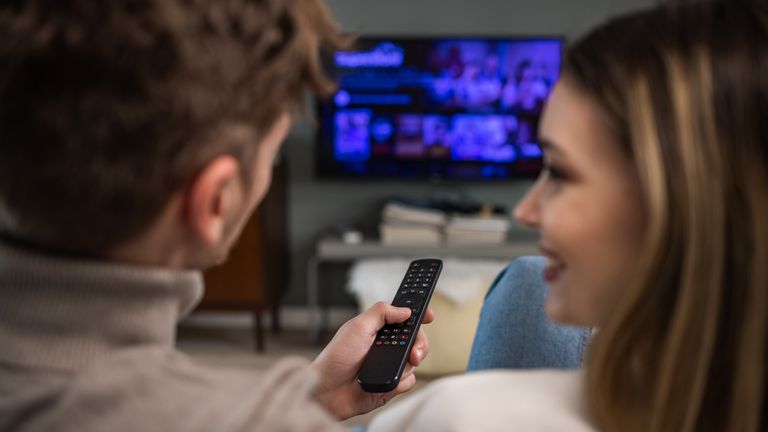Hanging in Sally’s* cupboard is a £3,000 Dior coat.
It is also a secret, and her husband doesn’t know about it.
“It has yet to make an outing. It will do shortly,” she tells Money.
“I got the assistant to put it on hold for three months. I saved and bought it without my partner knowing about it. I did not need another coat as I have several.”
And while he has spotted it in her cupboard – though not on any bank statements because they keep separate accounts – he has never said anything.
“It’s not going to surprise him, as things do appear, and my wardrobe has investment pieces in it,” she says, clarifying that investment usually translates to “expensive”.
“If he had to guess the value of my wardrobe, he would guess within £10,000 of the value. His guess would be conservative.”
According to a recent survey, nearly two-thirds of Americans who live with a spouse or significant other have hidden a purchase in the past year – known as “stealth shopping” – and it seems Britons are no different.
Brands even sometimes encourage it – the upmarket Fairfax & Favor has an “alibi box” you can tick when you place an order.
“We’ll include a tongue-in-cheek cunning little note saying your goodies are a competition prize or gift – pick your excuse and they need never know the truth,” the brand promises.
‘He hoped I wouldn’t notice the TV had grown overnight’
For Alice*, a woman in her 40s living in Devon, it was her husband who tried to sneak a new television into the house.
“He told our daughter he’d bought a new, bigger TV for Christmas and not to tell Mummy,” she says, explaining that he waited until she had fallen asleep before getting it out of the car and swapping it with their old one.
“He hoped I just wouldn’t notice the TV had grown in size overnight.”
After a discussion, she says she eventually dropped it, instead using it as a bargaining tool to get him to remove their surround sound.
“I think it’s about choosing your battles,” she says. “I wasn’t going to win this but I could get something I wanted out of it.
“He knew I would never have agreed to the new TV if we’d discussed the purchase.”
‘When I do spend, I feel a bit guilty’
Natalie says she doesn’t think her husband would even care, but she still finds herself downplaying her purchases, with one of the latest being tickets to the Strictly Come Dancing live shows.
“My boys are obsessed with Strictly and it’s one of the few things we all watch together as a family. For the four of us, it was £340, which is the most I’ve ever spent on tickets for an event,” she tells Money.
“I know my husband would think it’s outrageous, so I told him it was ‘reasonable’ and he didn’t ask the exact price.”
Natalie downplays purchases, she says, because she doesn’t want to justify the cost if she has “consciously researched and thought about what I am buying”.
In part, she attributes this to her upbringing – she grew up in a working-class family that didn’t have much extra money.
“My parents always saved for holidays and spent any extra cash on that, so they didn’t spend on ‘luxuries’ or expensive things – even now they love a bargain,” she says.
“I think that made me quite frugal with money sometimes. So when I do spend on something I consider to be a luxury or an investment, I feel a bit guilty even though I’m not spending more than I can afford.”
Read more from Money:
Outrage after bingo prizes taken back
Personal shopper’s £100 wardrobe tip
‘My brother-in-law has to go – but I don’t want to be his guarantor’
Natalie also struggles with the wage disparity between her and her husband.
She runs a small business and also works for a charity, taking home about 25% of the salary her husband, a lawyer, does (they both pool the majority of their money together in a joint account).
“I do more of the childcare and household stuff and when my children were younger, I worked part-time to be around more for them,” she says.
“So we are both contributing in different ways but financially I’ll never earn as much as him.
“I’m very conscious of the difference in income and it bugs me that our relationship is quite old-fashioned in that way.”
Why we do it… ‘Money isn’t just about numbers’
Catherine Morgan, a financial coach, author and wellbeing speaker, says hiding purchases can be a way of avoiding difficult conversations about our financial values.
“The relationship we have with money is really a mirror reflection of the relationship we have with ourselves,” she says.
“Therefore, the need to hide purchases often stems from our deep-rooted emotional relationship with money.
“When we hide purchases, we’re usually not just concealing the items themselves, but responding to underlying feelings of shame, guilt or fear of judgement.
“We worry what people might say, which will often exaggerate these feelings. Money isn’t just about numbers – it’s deeply intertwined with our identity, values, and a deep sense of security.”
It can be a “significant issue”, she says, as it may signal “deeper challenges” in a relationship.
And while the odd pair of shoes may not seem a problem, hiding purchases can be problematic when it starts to affect your emotional wellbeing, with warning signs including anxiety, guilt and consistently hiding purchases and bank statements.
Your relationship with money
Like all relationships, our one with money can always be “healed and improved”, Morgan says.
She recommends exploring what triggers your spending habits and what emotions arise when you feel the need to hide purchases.
“Often it comes alongside feelings of boredom, stress or even hunger,” she says.
“Understanding your nervous system’s response to money matters is crucial.
“When we feel financial shame or anxiety, our body often goes into a stress response – heart racing, shallow breathing or feeling overwhelmed.
“Learning to recognise these physical signs can help you pause before making impulsive purchases.
“Simple practices like deep breathing or taking a mindful moment before spending can help regulate your nervous system and create space for more conscious financial decisions.”
* Some names have been changed



